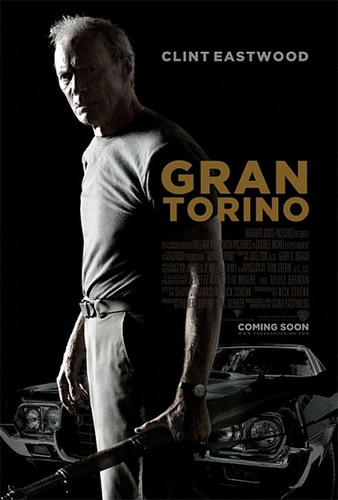Sigh. Big, BIG sigh. Before I get into the painfulness that was Gran Torino, let me just rant a bit. It seems like this is one movie of two this awards season that has gotten critics to drink Kool-Aid. A big pitcher of Kool-Aid. For whatever reason, the fact that Clint Eastwood is back, holding a shotgun, and growling has gotten enough critics in a tizzy that they are able to ignore whatever flaws this film has (the other film is Milk, by the way, a modern classic compared to this).
The critical consensus that I've heard and read is that despite its flaws, Gran Torino has a great performance from Eastwood, and is worth seeing for that. Wrong, wrong, wrong. Technically, Eastwood does have the best performance in Gran Torino, but that's because he surrounds himself with first-time actors and no-name faces who appear for only a few minutes. If anyone did that, anyone with a mite of acting talent, then they'd give the best performance as well. The only difference is that the Academy loves Clint, so he'll get an undeserved Oscar nomination.
Why does the Academy love Clint? He's given them, to be fair, many good reasons. Movies like Unforgiven, Million Dollar Baby, Letters from Iwo Jima, and even Mystic River. I fear that love is blinding them, or making them accept the racism inherent in this film.
And let's get to this film, whose message is...Racism is funny! No, wait....Racism is bad....but funny! Something close to that is true, unfortunately. The plot is simple: Eastwood is Walt Kowalski, a Korea War vet who just lost his wife. Walt is angry at lots of stuff, especially the Hmong families moving in around him in his Detroit house. When a Hmong gang begins terrorizing his neighbors, Walt learns that these people, who he's called unprintable words, are actually good human beings and helps them fight back.
Simplicity is fine, but this movie is so painful to watch, so sad and so offensive, that this cannot be Eastwood's last film as director or actor. As director, Eastwood remains workmanlike in his quality. As actor, he's got one note that he can play well. This movie, however, is so embarrassing to watch, not only because of first-time thespians like Bee Vang (as Tao, the boy next door) and Ahney Her (the boy's sister), but because of clunker scenes in a barbershop, with John Carroll Lynch as the strangely, goofily racist barber; Lynch is much better when he's not talking so much, as in Fargo and Zodiac.
Even more embarrassing is how in the past this movie is. Not just the character of Walt, who is, we are told obviously, living in the 1950s. No, the entire movie, the way Nick Schenk develops the characters in his screenplay. This is melodrama at its lowest, with viewpoints as outdated as those who supported a certain presidential candidate who did not win the job. When Walt grouses that his kids don't buy American cars, some audience members may laugh as if they agree, but with the whole automotive bailout going on in the world....can you blame them?
When Walt dredges up stereotypical slurs against Irish people, Jewish people, Black people, Asian people, and on and on and on, it's painful to watch. It's not funny (though some of the audience, living in the past with Clint, may feel differently), it's just sad. I had problems with Eastwood's earlier film this year, Changeling, but that film was not nearly as flawed as this one. It also had the good sense to be set in the 1930s, when old-fashioned ideas were not old-fashioned, as they are so glaringly in Gran Torino.
One star out of four

No comments:
Post a Comment